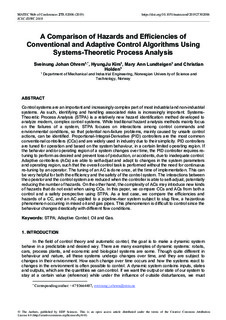| dc.contributor.author | Ohrem, Sveinung Johan | |
| dc.contributor.author | Kim, Hyungju | |
| dc.contributor.author | Lundteigen, Mary Ann | |
| dc.contributor.author | Holden, Christian | |
| dc.date.accessioned | 2019-03-20T08:00:36Z | |
| dc.date.available | 2019-03-20T08:00:36Z | |
| dc.date.created | 2019-02-27T13:46:31Z | |
| dc.date.issued | 2019 | |
| dc.identifier.citation | MATEC Web of Conferences. 2019, 273 . | nb_NO |
| dc.identifier.issn | 2261-236X | |
| dc.identifier.uri | http://hdl.handle.net/11250/2590741 | |
| dc.description.abstract | Control systems are an important and increasingly complex part of most industrial and non-industrial systems. As such, identifying and handling associated risks is increasingly important. Systems- Theoretic Process Analysis (STPA) is a relatively new hazard identification method developed to analyze modern, complex control systems. While traditional hazard analysis methods mainly focus on the failures of a system, STPA focuses on interactions among control commands and environmental conditions, so that potential non-failure problems, mainly caused by unsafe control actions, can be identified. Proportional-Integral-Derivative (PID) controllers are the most common conventional controllers (CCs) and are widely used in industry due to their simplicity. PID controllers are tuned for operation and based on the system behaviour, in a certain limited operating region. If the behavior and/or operating region of a system changes over time, the PID controller requires retuning to perform as desired and prevent loss of production, or accidents, due to inadequate control. Adaptive controllers (ACs) are able to self-adjust and adapt to changes in the system parameters and operating region, such that the overall control task is performed without the need for continuous re-tuning by an operator. The tuning of an AC is done once, at the time of implementation. This can be very helpful for both the efficiency and the safety of the control system. The interactions between the operator and the control system are reduced when the controller is able to self-adjust, potentially reducing the number of hazards. On the other hand, the complexity of ACs may introduce new kinds of hazards that do not exist when using CCs. In this paper, we compare CCs and ACs from both a control and a safety perspective using STPA. As a test case, we compare the efficiencies and hazards of a CC, and an AC applied to a pipeline-riser system subject to slug flow, a hazardous phenomenon occurring in mixed oil and gas pipes. This phenomenon is difficult to control since the behaviour changes drastically with different flow conditions. | nb_NO |
| dc.language.iso | eng | nb_NO |
| dc.publisher | EDP Sciences | nb_NO |
| dc.relation.uri | https://doi.org/10.1051/matecconf/201927302006 | |
| dc.rights | Navngivelse 4.0 Internasjonal | * |
| dc.rights.uri | http://creativecommons.org/licenses/by/4.0/deed.no | * |
| dc.title | A Comparison of Hazards and Efficiencies of Conventional and Adaptive Control Algorithms Using Systems-Theoretic Process Analysis | nb_NO |
| dc.type | Journal article | nb_NO |
| dc.type | Peer reviewed | nb_NO |
| dc.description.version | publishedVersion | nb_NO |
| dc.source.pagenumber | 19 | nb_NO |
| dc.source.volume | 273 | nb_NO |
| dc.source.journal | MATEC Web of Conferences | nb_NO |
| dc.identifier.doi | https://doi.org/10.1051/matecconf/201927302006 | |
| dc.identifier.cristin | 1681049 | |
| dc.relation.project | Norges forskningsråd: 237893 | nb_NO |
| dc.description.localcode | © The Authors, published by EDP Sciences. This is an open access article distributed under the terms of the Creative Commons Attribution License 4.0 (http://creativecommons.org/licenses/by/4.0/). | nb_NO |
| cristin.unitcode | 194,64,92,0 | |
| cristin.unitname | Institutt for maskinteknikk og produksjon | |
| cristin.ispublished | true | |
| cristin.fulltext | original | |
| cristin.qualitycode | 1 | |

